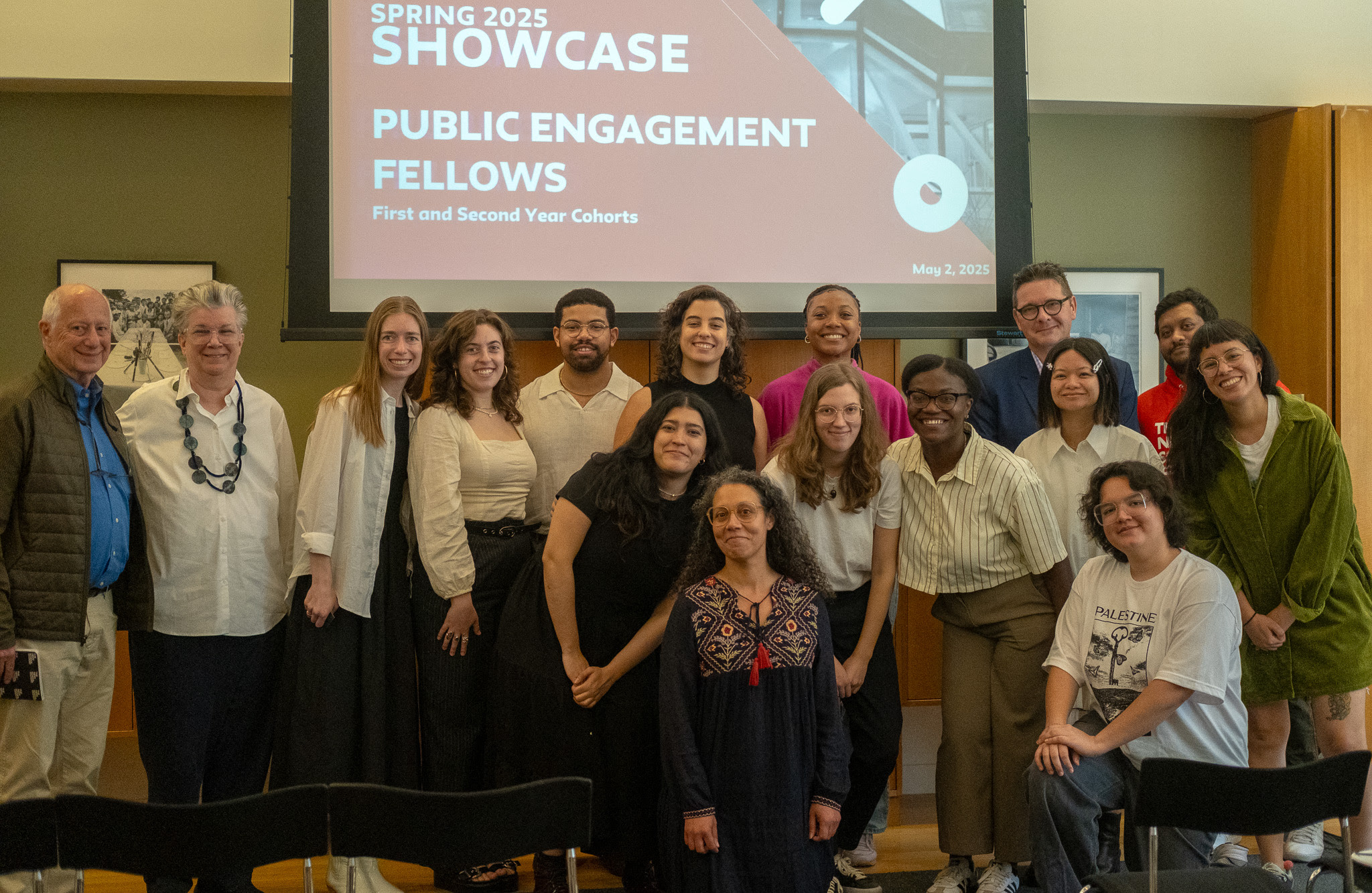
New School Fellowships Connect Theory with Praxis for Undergraduate and Graduate Students
At The New School, learning is not confined to the university’s colleges. Educational opportunities are also found at the more than 30 centers, labs, and institutes at the university and with the multitude of community organizations that partner with The New School. Students are expected to think critically about current issues within their academic studies, but they’re also encouraged to apply their knowledge to real-world challenges through several of the fellowship opportunities offered at the university. The Public Engagement Fellowship at the Schools of Public Engagement (SPE), the Social Change Fellowship at The New School for Social Research (NSSR), and the recently launched Arts and Humanities Fellowship at Eugene Lang College were all developed to provide students with real-world opportunities to put theory into practice.
The Public Engagement Fellows program provides a two-year fellowship for incoming students committed to addressing equity, inclusion, and social justice issues while pursuing a bachelor’s or master’s degree. Launched in 2023, the program includes three main components: a financial stipend, special public programs, and placement upon enrollment in one of the university’s centers, labs, and institutes. These include Vera List Center for Art and Politics, the Tishman Environment and Design Center, The New Hood, SexTech Lab, Center for NYC Affairs, Platform Cooperativism Consortium, and the Institute on Race, Power and Political Economy, and others.
The first two cohorts from the program recently presented their work during a showcase event and discussed how the fellowship informed their coursework and their career plans and created a space for them, apart from their academic programs, to network, learn, and explore.
“Mary Watson, executive dean emeritus of SPE and an associate professor of inclusive leadership and management at the university, had a vision of creating a fellowship around public engagement and social justice that paired incoming students with the university’s centers, labs, and institutes. Working together, we wanted to integrate the centers more into the curriculum and give students an opportunity to apply their learning as soon as they got to The New School,” says Fabiola Berdiel, associate dean for Partnerships and Practice-Based Learning at SPE. “We had a vision for the fellowship but knowing if the experience would meet our design expectations and the students’ expectations was an outcome we could not predict. As such, it was wonderful to hear from the Fellows, without prompting, that they’ve found the experience rewarding. We have been gratified as well that the new fellowship has matched our expectations.”
NSSR’s Social Change Fellowship, which also launched in 2023, was created to prepare PhD and master’s students for careers outside of the academy. The fellows are connected with paid internships at external organizations committed to social justice, allowing them to begin applying the skills acquired in their graduate programs in different professional settings.
The fellowship interested Stephanie Rodriguez Ugolotti, an MA Anthropology student, as it “offered a chance to connect my academic studies with my region and nonprofit work here in New York. Many of us pursue social research at The New School because we want to contribute to real change, even though it feels impossible.”
Rodriguez Ugolotti was placed with the International Crisis Group’s Latin America and Caribbean Program, which allowed her to stay connected to Latin America and better understand the political and socioeconomic dynamics of the region.
“This experience helped me better understand the regional context and also the Amazon, which is the territory that I have been working with in the last years. Part of conflict resolution is learning to identify tensions early to respond effectively. Unfortunately, in my own country, Peru, I have often seen authorities respond in the exact opposite way. I hope this experience equips me to support responses to conflict better, whether from social movements, academia, or the public sector, if I have the chance to contribute there again in the future,” says Rodriguez Ugolotti.
In creating the fellowship, NSSR looked to another successful program, Eugene Lang College’s Social Science Fellowship, which maintains strong partnerships with many organizations committed to social justice by connecting undergraduates with internship opportunities. Eugene Lang College itself looked to the fellowship in developing a similar program to support students in the arts and humanities.
Lang’s recently launched Arts and Humanities Fellowship offers students in those disciplines an experience similar to that provided by its Social Science Fellowship. Both fellowships are designed to combine research and praxis, with a fall internship at a New York City organization followed by an independent project in the spring that expands on that experience. Throughout the fellowship, students are matched with a New School PhD student who advises them on developing and executing their projects, which may take the form of a creative project or a research paper.
The four partner organizations for 2025–2026 are the Center for Traditional Music and Dance, Giorno Poetry Systems, the Museum of the Moving Image, and the Poetry Society of America. “We selected these organizations based on input from both faculty and students about areas of student interest and organizations that have been welcoming to partnerships or collaboration with The New School in the past. We strive to build lasting, mutually beneficial relationships with our partner organizations—many of our Lang Social Science Fellowship organizations have been with us for a number of years, and we hope for the same with the Arts and Humanities Fellowship,” says Jane McNamara, associate dean of Strategic Initiatives and Civic Partnerships at Lang.